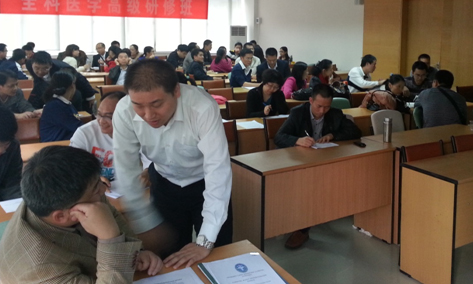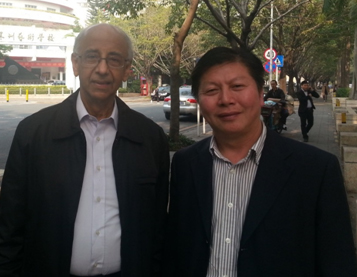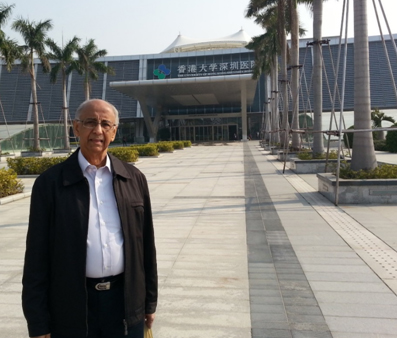Workshop on quality improvement held in Shenzen, China
China’s healthcare reform is marching forward. It is a mighty task and therefore it is important that the direction of changes conform to international norms. As such the WONCA working party on quality and safety was invited to conduct a one day workshop to introduce the methods of applying the principles of quality practice. On the 6th December, 2013 a group of about 80 primary care physicians from the community health centres in Shenzen China gathered at the Postgraduate Institute of Medicine to participate in the workshop.
Quality Improvement Program
Venue: Shenzen Continuing Medical Education Centre
Date: 6 December, 2013
Method: workshop format
Faculty members:
Director: Prof Xia Junjie
Convenor: Professor Daniel Thuraiappah, Chair, WONCA Working Party in Quality and Safety in Family Medicine
Co-ordinators: Dr Wang Su, Dr Li Yang, Dr Wu Sha, Dr Li Yue

Shenzen Continuing Medical Education Lecture Room with 80 primary Care Physicians. Drs Li Yang and Wang Su in the front.
All participants responded positively to the workshop. Most found this program new to them but found it challenging to implement the program in their working environment. The issue of team agreement was daunting. There was need of more courage and motivation as quality healthcare is not in purview. Currently an annual “audit” is carried out on equipment and facilities but not on services.
The concept of developing indicators in management of diseases was important as it emphasised the issue of looking for the essential signs and symptoms of diseases in a very short time as time for seeing patients were short.
China, including Shenzen is keen on transforming the healthcare as socialised medicine, although has sustained the safety net, is facing the realty of rising healthcare costs to the government. The government is spurred by WHO ideals of raising the standards of care and to spread the safety net wider especially the rural areas, which are still underserved. Workshops on quality and safety need to be duplicated and sustained and local human resources have to be developed. Leadership skills to manage quality improvement programs have to be continuous.
Postgraduate training of general practitioners is carried out at the Hong Kong University-Shenzen Hospital built two years ago with state of the art facilities by the Shenzen City Council and managed by the Hong Kong University Hospital. The Family Medicine specialists manage the primary care centre training local interested medical officer residents under contract for two years. Professor Cindy Lam teaches once a week.
The Shenzen Medical Centre managed by the Hong Kong University Medical Faculty. The environment is spacious and facilities are well provided with health screening for adults, women and children, with chronic diseases management centre, substance abuse clinics are well provided. The healthcare system provides for a minimum package of services for the citizens, however, here the phenomenon of private care is looming where the increasing rich seek prime care. If transformation is slow, then the dual system will flourish.
The Shenzen City Council has dedicated one community health centre to teaching where there is a floor with consultation rooms with CCTV facilities to monitor the sessions. At the outpatient centre both traditional Chinese medicine and allopathic medicine is practised. The consultation rooms are placed but often more than one patient is seen at the same time. The government statistics show that there is growing trends of being understaffed both officers and assistants.
 Prof Xia Junjie with Prof Daniel Thuraiappah
Prof Xia Junjie with Prof Daniel Thuraiappah
Professor Xia Junjie, Director of the Shenzen Post Graduate Institute of Medicine is constantly in touch with Beijing for progress. Shenzen has grown from a small fishing village in the hinterland of Hong Kong twenty years ago to a bustling commercial city of 7.5 million population most of whom are immigrants from other parts of China. It is a city of potential, especially health wise for systematic development in the healthcare industry. The primary health care systems will require post graduate education for all medical officers and development in quality and safety in family medicine.
The Workshop ended with a resolve that improvement in practice is important and is possible.
All delegates were awarded with a Certificate of Attendance in Quality Improvement Program. They will be expected to carry out an audit of their practice and implement recommendations of the quality program in their place of practice. After 6 months the second audit is to be carried out to see if there were improvements in their own practice. One of the ways of measuring improvement was to get patient feedback and would be part of the audit. On satisfactory completion of the quality program audit in their place of practice, the practice will be awarded a “Quality Clinic” certificate.
In order to encourage and motivate the practice of audit it was proposed that an annual prize be awarded for the best community health centre audit carried out. Recognition of achievement should be encouraged for progress.

Prof Daniel M Thuraiappah
Chair, WONCA Working Party on Quality and Safety in Family Medicine
(photographed on site)